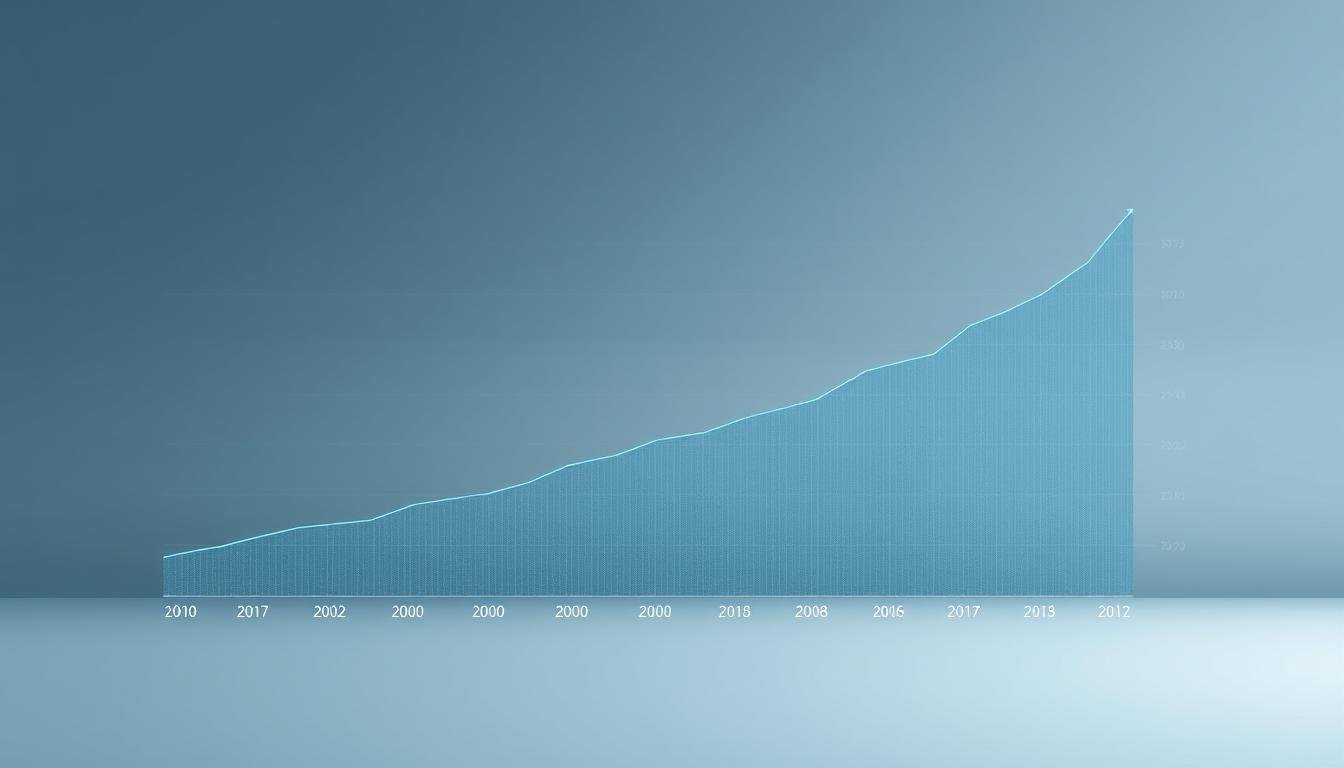The demand for cybersecurity professionals is projected to surge by a remarkable 31% over the next decade. This places cybersecurity among the fastest-growing fields in the United States. As such, grasping the cybersecurity analyst salary landscape is imperative for both aspiring and current professionals. With companies increasingly valuing online security, understanding compensation can significantly influence your career choices and earning potential.
The average compensation for cybersecurity analysts not only underscores their critical role in protecting organizations but also fluctuates based on location, experience, and industry. In this article, we’ll dissect the cybersecurity analyst wages across the nation, shedding light on the pivotal factors that dictate salary scales. Whether you’re considering a transition into this field or are currently charting your career path, you’ll uncover vital information to refine your understanding of potential earnings.
For a more detailed exploration of your potential earnings, refer to this guide on cybersecurity analyst salary.
Key Takeaways About Cybersecurity Analyst :
- The cybersecurity field is expected to grow by 31% in the next decade.
- Understanding salary ranges aids in career planning and development.
- Salary varies significantly based on location and experience.
- Certifications can substantially increase your earning potential.
- Staying informed on industry trends is crucial for negotiation strategies.
Overview of Cybersecurity Analyst Roles
Exploring cybersecurity analyst roles reveals their vital functions. These professionals are at the forefront of defending systems and networks against cyber threats. Their daily tasks involve a variety of cybersecurity duties aimed at protecting sensitive information.
What Does a Cybersecurity Analyst Do?
Cybersecurity analysts are tasked with monitoring security systems and identifying potential threats. They analyze security breaches to uncover their causes and develop strategies to prevent future incidents. Their responsibilities include:
- Monitoring network traffic for unusual activities
- Conducting vulnerability assessments
- Implementing security measures and protocols
- Preparing incident reports and analysis
Key Responsibilities and Skills
Proficiency in security protocols is essential for cybersecurity analysts. They must be skilled in using various tools to perform their duties effectively. Analytical thinking is crucial for interpreting data and predicting threats. Key responsibilities include:
- Responding to security incidents efficiently
- Staying updated on the latest cybersecurity trends
- Collaborating with IT teams to improve organizational security
- Educating staff on cybersecurity awareness
Average Salary for Cybersecurity Analysts in the US
Grasping the average salary for cybersecurity analysts is crucial for both those entering the field and employers. Compensation in this sector is influenced by several elements, including location, experience, and educational background. National salary statistics indicate that cybersecurity analysts can earn a competitive income. This reflects the increasing significance of their role in protecting organizations.
National Average Salary Insights
The average cybersecurity analyst salary in the United States shows considerable variation. This is due to geographical location and the industry of employment. The U.S. Bureau of Labor Statistics reports an average salary around $100,000 annually. This figure underscores the critical role of cybersecurity in business operations, prompting employers to invest more financially.
Salary Distribution Across States
Looking at the cybersecurity analyst income by state reveals significant disparities. Some states pay more due to higher demand for cybersecurity experts or a higher cost of living. For example, California and New York are among the highest-paying states, with salaries often exceeding $120,000. In contrast, states with lower living costs tend to offer salaries closer to the national average. Several factors influence salary distribution:
- Cities with a strong tech presence generally offer higher wages.
- The cost of living significantly impacts salary ranges.
- Local demand for cybersecurity talent can drive salaries up.
To explore salaries across different locations, refer to resources that discuss cybersecurity analyst positions in depth. Understanding these variations is essential for career planning and salary negotiation.
Factors Influencing Cybersecurity Analyst Salaries
Exploring a career in cybersecurity analysis requires understanding the factors that impact salary. Education and certifications, alongside experience, are pivotal in determining one’s earnings. These elements significantly shape the financial prospects for cybersecurity professionals.
Education and Certifications Impact
Your educational background profoundly influences your salary. A degree in information technology, computer science, or cybersecurity is often a prerequisite. Higher degrees typically result in greater financial rewards. Certifications like CISSP, CISM, and CompTIA Security+ not only validate your expertise but also demonstrate your commitment to professional growth. Employers value these qualifications, offering higher compensation for candidates with advanced degrees.
Experience Level and Its Role
Experience in cybersecurity significantly impacts your salary. Entry-level analysts often start with lower salaries due to limited experience. As you accumulate skills and tackle complex security challenges, your earnings can increase substantially. Specialized knowledge in areas such as threat analysis and incident response can further enhance your earning potential. A robust resume highlighting relevant cybersecurity experience is crucial for securing higher-paying roles.
Salary Ranges Based on Experience
Understanding the salary landscape for cybersecurity analysts is crucial, as it varies with career stages. Salaries differ based on experience, affecting your earnings from entry-level to senior analyst. Below, we provide a breakdown of salaries by experience level.
Entry-Level Analyst Salaries
For newcomers to the cybersecurity field, the starting salary typically falls between $50,000 and $75,000 annually. This range is influenced by educational background, location, and specific skills. Many companies are willing to offer competitive salaries to attract new talent, making starting salaries attractive for recent graduates.
Mid-Career and Senior Analyst Salaries
With increasing experience, mid-career cybersecurity pay jumps to $85,000 to $115,000 yearly. Those with specialized skills or certifications often see salaries at the higher end. Senior analysts, with their advanced expertise and responsibilities, can earn upwards of $120,000, reflecting their value to the organization.
Job Demand and Cybersecurity Analyst Salaries
The demand for cybersecurity analysts is on the rise, as companies increasingly prioritize digital asset protection. The evolving nature of cyber threats necessitates enhanced security measures. This escalating need directly impacts salaries, creating a competitive job market for cybersecurity experts.
Industry Growth and Opportunities
Industry trends suggest a significant expansion in the cybersecurity field. Analysts foresee a substantial increase in demand for skilled professionals in the coming years. Various sectors are actively seeking qualified analysts to address emerging threats. The dynamic digital environment continuously generates new opportunities, with companies offering competitive salaries to secure top talent.
Job Locations with High Demand
Choosing a location for a cybersecurity career can significantly affect your salary. Major cities and tech hubs generally offer the most promising opportunities. San Francisco, New York, and Washington, D.C. stand out with abundant job openings and attractive compensation packages. Familiarity with these high-demand areas can guide your career choices effectively.
Cybersecurity Analyst Salaries by Industry

Exploring the variations in cybersecurity analyst salaries across industries is crucial for those pondering a career in this domain. The distinct roles within sectors like finance and healthcare significantly impact earnings. The challenges analysts face in their respective industries greatly influence their compensation.
Financial Sector
The financial sector is renowned for its competitive salaries for cybersecurity analysts. Banks and investment firms, prioritizing data protection, create a high demand for skilled professionals. Reports indicate that financial sector cybersecurity pay is among the highest, reflecting the critical nature of safeguarding financial data from cyber threats. As financial institutions enhance their security measures, attractive compensation packages await.
Healthcare Sector
In the healthcare sector, cybersecurity salaries are shaped by regulatory demands and the critical need to protect patient data. The rise in healthcare cybersecurity attacks has led to robust healthcare cybersecurity salaries. The focus on compliance with laws like HIPAA creates a unique demand for specialized knowledge. This results in competitive compensation for analysts committed to protecting sensitive patient information.
Importance of Certifications in Salary Increases
As you navigate the field of cybersecurity, understanding the impact of cybersecurity certifications on your salary becomes crucial. Certifications not only validate your skills but can significantly enhance your earning potential. Many employers recognize these credentials as indicators of expertise, which can lead to substantial salary boosts.
Relevant Certifications to Consider
In the realm of cybersecurity, specific certifications are highly regarded by potential employers:
- CISSP (Certified Information Systems Security Professional)
- CEH (Certified Ethical Hacker)
- CISM (Certified Information Security Manager)
- CompTIA Security+
- CCSP (Certified Cloud Security Professional)
These cybersecurity certifications provide not only knowledge but also credibility in a competitive job market.
Salary Boost from Certifications
Statistics reveal a direct correlation between certifications and salary increases. Analysts with relevant certifications can expect a notable boost in their earning potential. Data shows that professionals holding certifications often earn salaries significantly higher than their non-certified counterparts. As you work toward obtaining these certifications, remember that the certifications impact on salary can be substantial, leading to long-term career growth and security.
Negotiating Your Salary as a Cybersecurity Analyst

Understanding the nuances of salary negotiation for cybersecurity analysts is crucial. The right approach can significantly impact your earnings. Whether you’re entering the field or seeking career advancement, preparation and effective communication are key. Here are some essential tips to help you navigate this critical process.
Tips for Effective Salary Negotiation
- Conduct thorough market rate research to understand the average compensation for your role in various regions.
- Prepare your case with specific examples of your achievements and contributions.
- Practice discussing your expected salary with a friend or mentor to build confidence.
- Be flexible and open to discussing benefits and bonuses that may enhance your overall compensation.
- Timing is key; initiate the conversation once you’ve received an offer or during performance reviews.
Researching Market Rates
To align your salary expectations with industry standards, thorough market rate research is necessary. Utilize online resources, such as salary surveys and employment reports, to gather data on comparable roles in your area. This knowledge empowers you to support your negotiation requests. Be prepared to reference this data during salary discussions.
Salary Trends: How Cybersecurity Salaries Are Changing
Understanding salary trends in cybersecurity is essential, as it mirrors the industry’s dynamic evolution. The undeniable technology impact on salaries is evident, with advancements like artificial intelligence and machine learning redefining job roles. As these technologies become integral, expect shifts in compensation for cybersecurity analysts.
Impact of Technology Advancements
Technological progress significantly reshapes the cybersecurity field and its salary structures. The integration of automated systems and AI in security measures escalates the demand for adept professionals. Those with expertise in these new technologies often see higher salaries, highlighting a broader pattern where specialized skills equate to increased earnings.
Future Projections for Cybersecurity Salaries
The future of cybersecurity earnings appears bright, with a growing need for skilled analysts. Forecasts suggest that as cyber threats intensify, employers will seek out professionals with advanced skills. This trend implies a potential rise in salaries, driven by the imperative for businesses to invest in elite talent to protect their digital assets. Considering these factors, your compensation may closely align with the evolving cybersecurity sector’s demands.
Real-Life Examples of Cybersecurity Analyst Salaries
Exploring real-life salary examples across different states offers a nuanced view of cybersecurity analyst earnings. In California, for example, analysts often see wages surpassing the national average, thanks to the state’s thriving tech industry. On the other hand, Texas and Ohio present more modest salaries, influenced by local industry needs and cost of living. These comparisons underscore the pivotal role of geography in shaping one’s earnings within the cybersecurity realm.
Industry insights further illuminate salary expectations. Seasoned analysts stress the significance of experience and ongoing education in career progression and compensation. Interviews suggest that those with specialized certifications tend to secure roles commanding higher salaries, enhancing their market competitiveness. For a detailed look at salaries and job prospects in cybersecurity, visit here.
Real-life examples highlight the substantial salary variations influenced by location, qualifications, and industry specialization. Grasping these factors is crucial for effectively charting your career path and striving for salary growth in the ever-evolving cybersecurity landscape.
